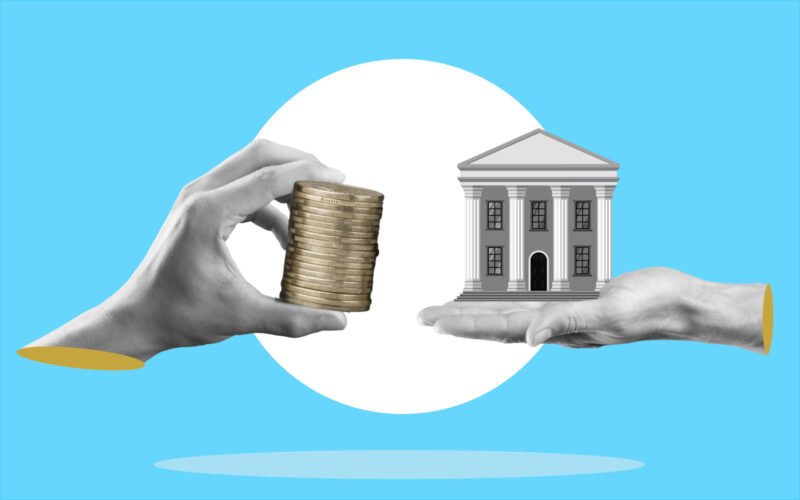How Do Interest Rates Affect My Loan?
Rates Affect My Loan Understanding how interest rates influence your loan is essential to making informed financial decisions. Whether you’re applying for a personal loan, mortgage, student loan, or car loan, the interest rate directly impacts the total amount you’ll repay over time. This article will explain the mechanics of interest rates, how they are determined, and how they can make your loan cheaper or more expensive.
Rates Affect My Loan What Is an Interest Rate?

Definition of Interest Rate
An interest rate is the cost of borrowing money, expressed as a percentage of the principal (original loan amount). It is what the lender charges you for using their funds.
Types of Interest Rates
- Fixed Interest Rate: Remains constant throughout the loan term.
- Variable Interest Rate: Can fluctuate based on market conditions or benchmarks like the RBI repo rate.
Factors That Influence Interest Rates
1. Central Bank Policy
Central banks (e.g., Reserve Bank of India) adjust interest rates to control inflation and stimulate or slow down economic activity.
2. Inflation
Lenders raise interest rates during inflationary periods to maintain the real value of money.
3. Loan Term
Shorter-term loans usually come with lower interest rates than long-term loans due to reduced risk exposure.
4. Credit Score
A higher credit score often translates into lower interest rates because you’re seen as a low-risk borrower.
5. Loan Type and Purpose
Mortgages, student loans, and personal loans all have different typical rates. Secured loans usually have lower rates than unsecured loans.
How Interest Rates Affect Loan Repayment
Monthly Payments (EMIs)
Higher interest rates result in higher Equated Monthly Installments (EMIs), increasing your monthly financial burden.
Total Interest Paid
Over the life of the loan, even a small increase in interest rate can mean thousands more in interest payments.
Loan Affordability
A higher interest rate may reduce the amount of loan you’re eligible for, especially if you have a limited income.
Case Study: Comparing Interest Rates
| Loan Amount | Interest Rate | Tenure | EMI | Total Interest Paid |
|---|---|---|---|---|
| ₹5,00,000 | 10% | 5 yrs | ₹10,624 | ₹1,37,446 |
| ₹5,00,000 | 12% | 5 yrs | ₹11,122 | ₹1,67,320 |
Insight: A 2% increase in the rate leads to ₹30,000 more in interest!
Types of Loans and Interest Rate Impact
Personal Loans
- Higher interest rates due to being unsecured.
- Sensitive to credit score and market rates.
Home Loans
- Often offered at lower rates.
- Can be fixed or floating, directly tied to repo rate in many banks.
Auto Loans
- Interest varies based on car type (new vs used), loan duration, and down payment.
Student Loans
- Government-backed student loans may have lower rates.
- Private education loans usually come with higher interest rates.
Fixed vs Variable Interest Rates

Fixed Rate Loans
- EMI remains constant.
- Ideal when interest rates are expected to rise.
Variable Rate Loans
- EMI may increase or decrease based on benchmarks.
- Beneficial in a falling rate environment.
Interest Rate and Credit Score Relationship
| Credit Score Range | Likelihood of Approval | Expected Interest Rate |
|---|---|---|
| 750–900 | Very High | Low |
| 700–749 | High | Moderate |
| 650–699 | Medium | Higher |
| Below 650 | Low | Very High |
Improving your credit score can help you secure a lower interest rate, saving you significant money.
Economic Impact on Interest Rates
Government Policies
Changes in taxation, monetary policy, and deficit financing can push interest rates up or down.
Market Demand and Supply
If demand for loans increases, banks may raise interest rates to manage risk and liquidity.
How to Minimize Interest Costs
1. Shop Around
Compare interest rates from different lenders and check offers from online aggregators.
2. Opt for Shorter Tenure
A shorter loan term typically attracts lower interest, reducing the total interest paid.
3. Prepayment and Part Payment
If your loan allows it, making lump sum payments can reduce principal and lower total interest.
4. Choose the Right Loan Product
Secured loans generally offer better rates than unsecured ones.
5. Maintain a Good Credit Profile
Pay EMIs and credit card bills on time to maintain a healthy credit score.
Common Myths About Interest Rates

Myth 1: Lowest EMI is Always the Best
Reality: Low EMI often means a longer tenure, increasing total interest cost.
Myth 2: Fixed Rates Are Always Better
Reality: Fixed rates provide stability but may be costlier in a falling interest rate environment.
Myth 3: Interest Rate Is All That Matters
Reality: Consider processing fees, prepayment charges, and other hidden costs too.
Also Read : 6 Mistakes To Avoid When Taking Out A Loans
Conclusion
Interest rates play a pivotal role in determining your loan’s overall cost and affordability. Whether you’re a first-time borrower or refinancing an existing loan, understanding how interest rates affect your EMIs, tenure, and total repayment is crucial. With the right knowledge and careful planning, you can secure favorable terms, minimize interest costs, and maintain your financial health.
FAQs on How Interest Rates Affect Loans
Q1. What is a good interest rate for a personal loan?
A: It varies by lender, but generally between 10%–15% in India is considered good for personal loans.
Q2. Can I negotiate my loan interest rate?
A: Yes, especially if you have a strong credit score or an existing relationship with the lender.
Q3. Do interest rates change after I take the loan?
A: Only if you opted for a floating or variable interest rate loan.
Q4. How do I calculate the total interest paid?
A: Use EMI calculators online or manually apply the formula: Total Interest = (EMI × Loan Tenure in Months) – Principal
Q5. Is it better to prepay a loan early?
A: Yes, prepaying reduces the principal and saves you from paying interest on the remaining amount.
Q6. How often do banks change interest rates?
A: Banks may review rates quarterly or in response to RBI policy updates.
Q7. How does inflation affect loan interest rates?
A: Higher inflation often leads to higher interest rates to reduce money supply in the market.
Q8. Will my EMI change if the repo rate changes?
A: If you’re on a floating rate loan linked to the repo rate, your EMI can change.
